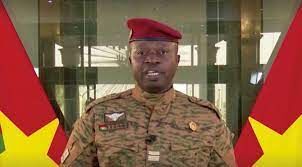Burkina Faso's Military Leader Puts Security First, Pushes Elections to the Backburner, Raising Concerns for Democracy
Burkina Faso's military leader, Captain Ibrahim Traore, declares that elections are not a priority, emphasizing the need for security amidst ongoing terrorist attacks, raising concerns about democracy and stability.
Burkina Faso's military leader, Captain Ibrahim Traore, stated on state television that elections in the country are not a priority, emphasizing that the focus should be on security. This announcement comes almost a year after Traore came to power in a coup. Despite his previous pledge to hold presidential elections by July 2024, Traore insisted that security remains the primary concern at present.
Supporters of Traore gathered in Ouagadougou to mark the first anniversary of the coup that brought the interim president to office. During a press conference, Traore expressed his intentions to bring about a partial change to Burkina Faso's constitution, claiming that the current constitution represents the views of only a few privileged individuals rather than the popular masses.
Traore also highlighted the improvement in security and the gains made by the armed forces. Burkina Faso has been plagued by attacks from terrorist groups such as al-Qaida and the Islamic State, causing the displacement of over 2 million people and resulting in the deaths of thousands.
Just last month, the country suffered heavy losses, with over 50 soldiers and volunteer fighters killed in clashes with Islamist militants. In response to a recent coup attempt, Burkina Faso detained four officers and vowed to shed light on the situation. The Sahel region has experienced several military coups in recent years, with Burkina Faso's military leadership recently signing a security pact with the neighboring juntas of Mali and Niger.
While Traore's statements about prioritizing security over elections have sparked controversy, the country continues to grapple with the ongoing threat of terrorism. The decision to delay elections raises concerns about the democratic process and the ability to restore stability to Burkina Faso.




